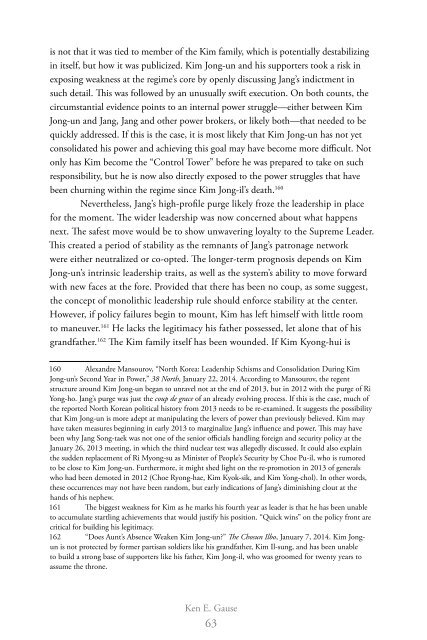North Korean House of Cards
HRNK_Gause_NKHOC_FINAL
HRNK_Gause_NKHOC_FINAL
You also want an ePaper? Increase the reach of your titles
YUMPU automatically turns print PDFs into web optimized ePapers that Google loves.
is not that it was tied to member <strong>of</strong> the Kim family, which is potentially destabilizing<br />
in itself, but how it was publicized. Kim Jong-un and his supporters took a risk in<br />
exposing weakness at the regime’s core by openly discussing Jang’s indictment in<br />
such detail. This was followed by an unusually swift execution. On both counts, the<br />
circumstantial evidence points to an internal power struggle—either between Kim<br />
Jong-un and Jang, Jang and other power brokers, or likely both—that needed to be<br />
quickly addressed. If this is the case, it is most likely that Kim Jong-un has not yet<br />
consolidated his power and achieving this goal may have become more difficult. Not<br />
only has Kim become the “Control Tower” before he was prepared to take on such<br />
responsibility, but he is now also directly exposed to the power struggles that have<br />
been churning within the regime since Kim Jong-il’s death. 160<br />
Nevertheless, Jang’s high-pr<strong>of</strong>ile purge likely froze the leadership in place<br />
for the moment. The wider leadership was now concerned about what happens<br />
next. The safest move would be to show unwavering loyalty to the Supreme Leader.<br />
This created a period <strong>of</strong> stability as the remnants <strong>of</strong> Jang’s patronage network<br />
were either neutralized or co-opted. The longer-term prognosis depends on Kim<br />
Jong-un’s intrinsic leadership traits, as well as the system’s ability to move forward<br />
with new faces at the fore. Provided that there has been no coup, as some suggest,<br />
the concept <strong>of</strong> monolithic leadership rule should enforce stability at the center.<br />
However, if policy failures begin to mount, Kim has left himself with little room<br />
to maneuver. 161 He lacks the legitimacy his father possessed, let alone that <strong>of</strong> his<br />
grandfather. 162 The Kim family itself has been wounded. If Kim Kyong-hui is<br />
160 Alexandre Mansourov, “<strong>North</strong> Korea: Leadership Schisms and Consolidation During Kim<br />
Jong-un’s Second Year in Power,” 38 <strong>North</strong>, January 22, 2014. According to Mansourov, the regent<br />
structure around Kim Jong-un began to unravel not at the end <strong>of</strong> 2013, but in 2012 with the purge <strong>of</strong> Ri<br />
Yong-ho. Jang’s purge was just the coup de grace <strong>of</strong> an already evolving process. If this is the case, much <strong>of</strong><br />
the reported <strong>North</strong> <strong>Korean</strong> political history from 2013 needs to be re-examined. It suggests the possibility<br />
that Kim Jong-un is more adept at manipulating the levers <strong>of</strong> power than previously believed. Kim may<br />
have taken measures beginning in early 2013 to marginalize Jang’s influence and power. This may have<br />
been why Jang Song-taek was not one <strong>of</strong> the senior <strong>of</strong>ficials handling foreign and security policy at the<br />
January 26, 2013 meeting, in which the third nuclear test was allegedly discussed. It could also explain<br />
the sudden replacement <strong>of</strong> Ri Myong-su as Minister <strong>of</strong> People’s Security by Choe Pu-il, who is rumored<br />
to be close to Kim Jong-un. Furthermore, it might shed light on the re-promotion in 2013 <strong>of</strong> generals<br />
who had been demoted in 2012 (Choe Ryong-hae, Kim Kyok-sik, and Kim Yong-chol). In other words,<br />
these occurrences may not have been random, but early indications <strong>of</strong> Jang’s diminishing clout at the<br />
hands <strong>of</strong> his nephew.<br />
161 The biggest weakness for Kim as he marks his fourth year as leader is that he has been unable<br />
to accumulate startling achievements that would justify his position. “Quick wins” on the policy front are<br />
critical for building his legitimacy.<br />
162 “Does Aunt’s Absence Weaken Kim Jong-un?” The Chosun Ilbo, January 7, 2014. Kim Jongun<br />
is not protected by former partisan soldiers like his grandfather, Kim Il-sung, and has been unable<br />
to build a strong base <strong>of</strong> supporters like his father, Kim Jong-il, who was groomed for twenty years to<br />
assume the throne.<br />
Ken E. Gause<br />
63



